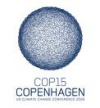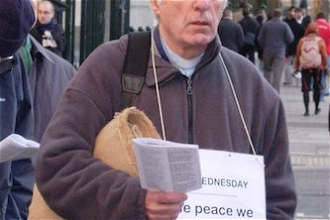Catholic agencies express sadness and anger at Copenhagen outcome

Catholic aid agencies around the world have expressed sadness and anger at the proposed 'Copenhagen Accord' which they describe as a weak and morally reprehensible deal which will spell disaster for millions of the world's poorest people.
Niamh Garvey from Trócaire/Caritas said: "Peoplein developing countries are already struggling with the effects of climate change. We only have a short window of opportunity to preventeven worse to come. The deal put forward in Copenhagen fails to providethe commitments that the science says is required. Millions of people are now fighting to keep their heads above water while politicalleaders stall'.
"It suggests an unambitious non-binding agreement that sees countries settheir own individual targets based on what is considered economicallyand politically viable rather than what is required by science andjustice," she said.
"While countries expressed a willingness to continue working, the proposed deal itself presents no clear time line for concluding a fair ambitious and legally binding agreement in the coming months."
"Over the last decade, a lack of political will has hamstrung international efforts to tackle climate change whilst theimpacts in developing countries have become increasingly severe.
'It is inconceivable that with more than 100 world leaders gathered together in one room to make a pact to solve a global problem, they have failed to commit themselves to adequate and binding obligations,said CIDSE Secretary General Bernd Nilles.
"They can call it an historical accord, a declaration, whatever they like. The reality is that leaders have failed to deliver a concrete and effective solution; they have passed up this historical opportunity to set a clear and collective pathway to a sustainable future," Nilles added.
The networks say the blame lies squarely at the feet of developed countries. Scientific evidence and economic analysis clearly sets out what is required from industrialised nations in terms of emissions reductions and support for developing countries, and they failed to produce the goods.
"Leaders may be lagging behind, but the level of commitment shown by people from all over the world in the run up to Copenhagen has shown unequivocally that the public is firmly behind a strong climate change deal. Leaders must now set a firm deadline for coming to a comprehensive and binding agreement as soon aspossible in the coming months, and we'll be watching them every step ofthe way," said Lesley Anne Knight, Secretary General of Caritas Internationalis.
"CIDSE and Caritas believe the world must accept nothing less than a fair,ambitious and legally binding agreement which commits
developedcountries to greenhouse gas emissions cuts of more than 40% by 2020 -based on 1990 levels. The alliance also wants to see wealthy nationsprovide $195 billion in funding by 2020 - on top of existing aid commitments - to help developing countries harness green technologies and protect themselves from the worst impacts of climate change.
Fabiola Quishpe, an indigenous farmer and community leader from rural Ecuador, who attended the first week of the summit, said world leaders had sanctioned the continuing destruction of ‘mother earth’. “The outcome means that governments will continue polluting our mother earth and we in Ecuador will continue to be affected by the changing climate,” she said.
Juvinal Dias from Progressio partner L’ao Hamutuk, in East Timor said: “We will be angry for a long time because urgent action had to be taken. We are very vulnerable to climate change in East Timor. The fisherman in my country may lose their livelihoods and have to go and live in the mountains because as our sea levels rise, some important places will disappear."
The climate summit’s weak outline of a global agreement fell far short of what Britain and many poor countries were seeking. The ‘Copenhagen Accord’ merely ‘recognises’ the scientific case for keeping temperature rises to no more than 2C and fails to include commitments to emissions reductions to achieve that goal.
As the end of the summit approached and a deal looked increasingly unlikely, a coalition of 30 NGO leaders from the developing world comprised of Progressio partners and staff warned: "If Copenhagen achieves nothing, the resulting delay to securing these vital agreements will be a terrible sentence for all human beings and the planet. The earth is a unique global ecosystem in which everything is interrelated. Today, misery afflicts many peoples of Africa, Asia and Latin America. Tomorrow other countries will face extinction too."
Tim Aldred, Progressio’s head of policy, said the summit outcomes were an ‘unacceptable failure of global leadership.’
“It is very sad that the most powerful politicians on earth have, in effect, betrayed people like Fabiola who come from poor communities and who are already coping with the droughts, floods, water shortages and storms linked to climate change.”
He added: “The voices of people worldwide called in their millions for world leaders to set aside self interest and to act together with courage. World leaders said they were listening, but they have not heard the calls. They have failed to act adequately despite being in full knowledge of the consequences of inaction for the planet, and the potential misery faced by hundreds of millions of people, some who are already suffering.
“The position is utterly unacceptable. The poor people that Progressio works with called ahead of this summit for urgent fair, ambitious and binding action. They are still waiting.”





















